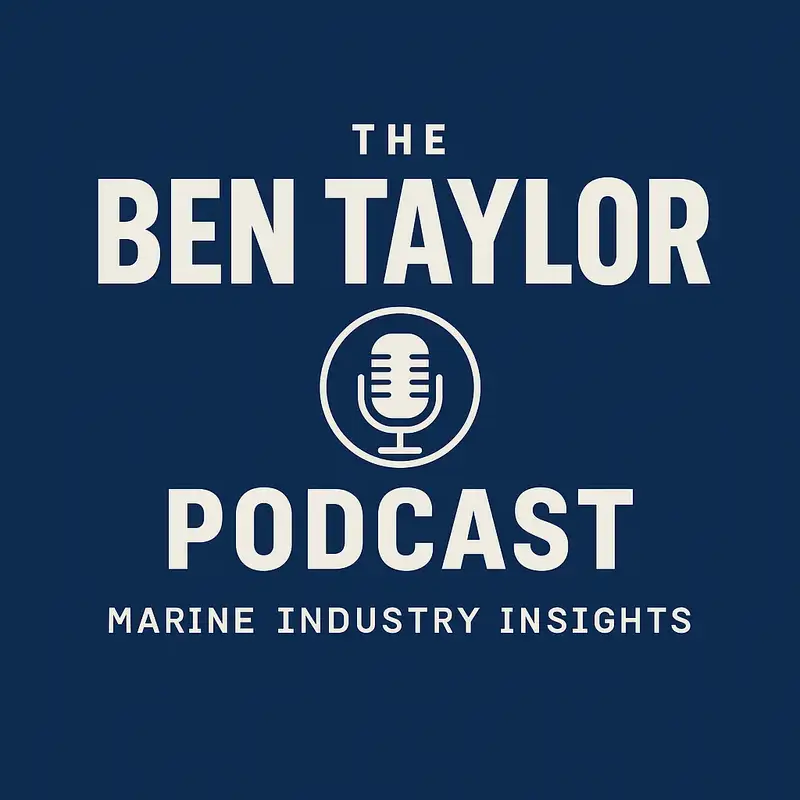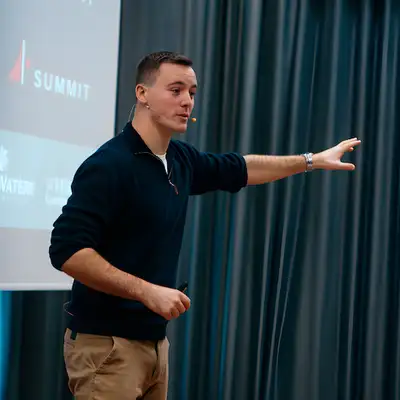
Merger Driven by Succession Planning & Strategic Advantages
We're just lucky to have the horsepower to be able to address, when you say what is the strategy, larger marine infrastructure projects we're now able to take in our stride. This is the Ben Taylor podcast, the home of marine industry insights. Enjoy. Hi everybody, welcome back to another episode of the Ben Taylor podcast. This little series is designed to profile the yachting scene in Australia. And so today we're going to hear from Marine Structures. I'm here with John Hogart. Nice to see you, John. G'day mate, how are you? Not bad, not bad at all. So let's have a little run down, because I believe there's quite a few recent developments that we'll get into. But what are you guys about? What do you do? So Marine Structures are the largest builders in Australia of marine infrastructure. So we build floating pontoons in somebody's backyard, right through to a superyacht marina, so anything and anything in between. So that involves, you know, pre-casting of concrete pontoons, piling barges, plastic rotor moulding, aluminium fabrication, and all of the engineering to bring the solution together for the client. Okay, and where is that manufactured? Is that here? Is it in different places in the world? Where is it supplied as well? So, as of about six months ago, we merged two well-known companies, like Superior Jetties has been at every one of these boat shows for the whole 36 years. And a competitor to us, both in South East Queensland, was the jetty specialist. And so really, as happens with many private companies, there comes a time when you've got to think about what the future looks like and succession planning. So I spoke to our competitor, and he has two sons that are very talented coming up through the industry. And Jacob and Dane Morris are now the leaders of the company, and I'm a director of the company too. We just put it all together with all the resources. And it's really been a wonderful experience. And I think it's something that a lot of companies should look at in our industry. That's so good to hear, because I suppose it's very easy to be pretty hostile to a competitor. But actually, with a bit of vision looking forward, you can say, actually, we're all better off together. Let's be clever about this. Let's make sure everyone's interests are addressed. And actually, as a result, you get a better organisation, a better future. I think in Australia, we're particularly good at these industry organisations, like AMX, Australian Marine Industry Export Group, Super Yacht Australia, the Marina Industry Association. And if you give of your time willingly for the good of the industry, the benefit of that is you get to know your competitor. And you get to know them in a more human way. Not that mongrel that beat you in a bid last week. It's you actually know their first name, and you know their family. You can understand their interest. You can understand their strategy. And then actually, as soon as there's synergy and something you can do together, you can have that conversation. You have that relationship. It helps. I think it's very healthy for the industry, because customers can say, well, they're a trusted supplier. Yes, they've sponsored us. Yes, they came to our event. They care about the industry. And when you meet similar companies that do this, everybody gets their share at the end of the day. But you learn that you're not really sworn enemies. You actually have quite common interests. And if you all want the right thing, things like this flow out of it. So support your industry, and good things can happen. OK, awesome. And just a vision looking forward, there's this merge that's taken place. You now operate under marine structures. And what's the kind of hope over the next few years? What does this grow into? What's like a little strategy? Look, I think what it's allowed us to do, we're 150 people strong now. Oh, wow, that's a big organization. We've got 10,000 square meters of manufacturing space. And where's that? In multiple factories, one here on the Gold Coast, and a larger 6,000 square meter building at Calandra on the Sunshine Coast, overhead cranes and all the things you need, because the pontoons are getting bigger. We've just completed the mega yacht marina a couple of years ago at Southport Yacht Club. Oh, OK, yeah, I was there the other day. Yep, Australia's longest super yacht berth. Yeah, it's also 165 meters. 165. That's the length of the dock. But you can take 135 meter vessel or 280s or 350s. Very flexible. Very well designed as well. Like all the infrastructure, it's cleverly put together from the electric feed being ready for the future and what's going to be needed there. Did you also reinforce the, I was wondering when I was there, I don't know why I didn't ask, but there's a fence line from the main road. Has that been reinforced so the heavy motors could be on the side? That was all excavated and the revetment wall was built to suit the security with the fence. You'll notice on the outside of that concrete wall, there's a facial ID to get in. And down the side is a concrete road that'll take B double semis for fuel bunkering straight from the truck. Yeah. So it's really clever. Yeah, clever. And we're going into a bit of a case study here, but typically is it quite early stage when you start talking with the customer in the design phase and say, OK, well, what's your aim here? What's the landscape around? What kind of things do we need to consider? It's quite a difference from, you know, here's a floating pontoon. Yeah. Look, we've had to diversify really to make everything viable. So while a residential customer might be an impulse buy, they bought a house, they want a pontoon. Right. But that could be productized. But they'll make a decision in two weeks. And if it's approved in two months, it'll be in three months. Yeah. Whereas a marina purchase, by the time they go through their approvals process and everything, it could be five years. Yeah. But you've got to remain interactive. And then larger government work, which has very high safety standards these days. We've had to really up our project management. Yeah, it's great being in a high revenue project and saying, well, yeah, we just won the five million pound bid. Yeah, that's great. But it might take a lot of work. A lot of work. Yeah. But we're just lucky to have the horsepower to be able to address when you say, what is the strategy, larger marine infrastructure projects. We're now able to take in our stride, whereas there might have been a stretch for us before. Right. Yeah. Hence this unity, the restructuring, let's merge together, share resources and for a better future. And we're really reflecting the marketplace. Our customers are consolidating. We're getting these marina groups now. They're more professional. Yeah. So if you're customer facing, you've got to be able to stay with it. Match it. Yeah. OK, John, thank you very much for your insights. Thank you. Awesome to see what you're doing here about it. Thanks for coming to us. Yeah, you're very welcome. Yeah. Thank you. Everybody, if you enjoyed content out of this, make sure you're following here to see plenty more of it. All being well, we'll see you again next time. Bye for now. Bye. Thank you for listening to another episode of the Ben Taylor podcast, the home of marine industry insights. We'll see you again very soon. Bye for now.
Creators and Guests
